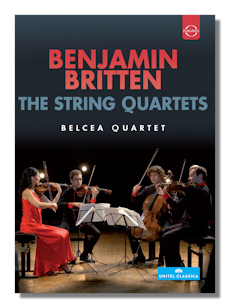
The Internet's Premier Classical Music Source
Related Links
- Britten Reviews
- Latest Reviews
- More Reviews
-
By Composer
-
Collections
DVD & Blu-ray
Books
Concert Reviews
Articles/Interviews
Software
Audio
Search Amazon
Recommended Links
Site News
 DVD Review
DVD Review
Benjamin Britten

The Complete String Quartets
- Quartet for Strings #1 in D Major, Op. 25
- Quartet for Strings #2 in C Major, Op. 26
- Quartet for Strings #3, Op. 94
Belcea Quartet
Euroarts/Unitel Classica DVD 2072768 LPCM Stereo Dolby Digital DTS Widescreen
The trend toward Blu-ray and DVD issues has largely left both the string quartet and the post-Romantic twentieth century behind. Most issues are recorded concerts of big nineteenth century/early twentieth century symphonies and concertos, often simply recycled TV performances. This very nice disc of Benjamin Britten's three string quartets goes some way towards redressing the balance. Hopefully it will encourage others to make more imaginative use of Blu-ray and DVD.
The three Britten quartets (somehow it seems a little over the top to refer to a total of 80 minutes of music as the complete Britten string quartets!) were recorded in June 2014 in front of a tiny audience (a couple of dozen, or so) at the Studio Davout in Paris – no stage or proper seating, just chairs loosely arranged. The format works well, allowing the filmmaker, Frédéric Delesgues, to concentrate on the music. Delesgues does a very good job of bringing out the silent communication between the musicians, and focusing on a single instrument doesn't seem quite as crudely selective as it often does in orchestral videos, where filming can seem to foreclose on the complexity of the musical texture.
Britten's first two string quartets were written a few years apart in the 1940's, with a 30 year gap to the third in 1975, written a few months before his death. Although plainly not carrying the weight of the Bartok and Shostakovich cycles, they are very fine pieces, showcasing Britten's formal preoccupations and dexterity, as well as his harmonic inventiveness and haunting melodic imagination.
The first quartet was composed on Long Island in July 1941. It is an elegant piece with considerable humor (in the scherzo, for example). But the emotional tone is set by the shimmering introduction at the very top of the instruments' registers. The center of gravity of the quartet is in the Andante calmo third movement, which has strong echoes of the introduction. The finale opens with more playful humor, but ends with percussive drama, well communicated by the Belcea Quartet.
The second is probably the best-known of the three, written in 1945 to commemorate the 250th anniversary of Henry Purcell's death. The three movement quartet is dominated by the final Chacony (Britten uses the old English spelling of "chaconne"), but the first two movements lay the musical ground most effectively. The chacony itself is made up of 21 variations on a Purcell-like theme. The variations are organized into four groups (focusing on harmonic, rhythmic, melodic, and formal permutations respectively), each separated by a cadenza played by the cello, viola, and first violin respectively. The musicians of the Belcea quartet rise to the challenge.
In the five-movement third quartet, written when his health was failing, Britten displays more of the percussive approach to rhythm that we see in the first quartet, particularly in the second (Ostinato) and fourth (Burlesque) movements. The first movement, curiously entitled "Duets", does indeed open with a duet, but then morphs into "duets for four instruments". The middle movement is a highly expressive, lightly accompanied solo for the first violin. The final Recitiative & Passacaglia is its match in expressiveness, while looking back formally to Purcell. This quartet deserves to be much better known.
The Belcea Quartet are very comfortable with Britten's musical idiom, delivering performances of great insight and complete technical mastery. This is their second recording of the Britten Quartets. The first, for EMI in 2005, won the Midem Cannes award, and was well received. Hopefully these filmed performances will be too. Highly recommended.
Copyright © 2015, José Luis Bermúdez





















